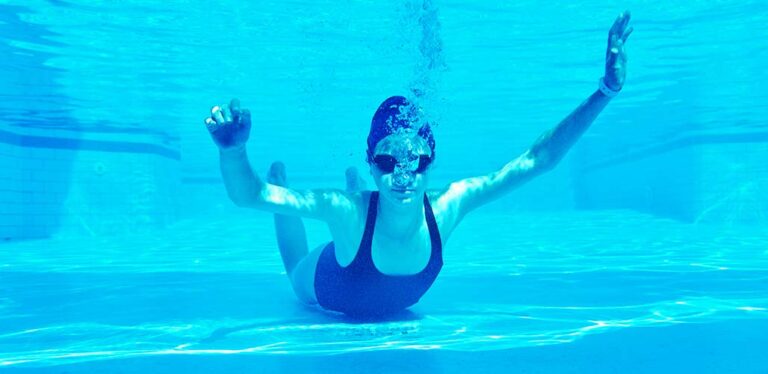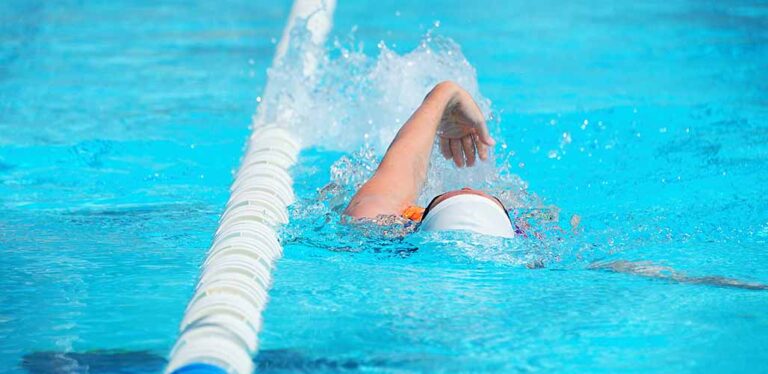Are Swimmers Happier?
Swimming always brings a smile to my face, but are swimmers happier than other people? Recent research appears to suggest that swimmers have the edge over other athletes when it comes to mental and emotional health and wellbeing. And swimming isn’t bad for physical health, either! Today I’ll look into whether it’s really true that simply choosing swimming as a regular sport will make you a happier person. And help you to decide whether you’ll get the same benefits from any type of exercise or if it is just swimming that improves happiness.
Contents
- Are swimmers happier than other people?
- How does swimming help you emotionally?
- Why does swimming feel so good?
- Other benefits of swimming
- Are swimmers good lovers?
Are Swimmers Happier?
Does swimming make you happier than the non-swimmers you know? This is one of those cookie cutter questions that attempts to answer a big question by looking at just one lifestyle choice – in this case, swimming.
Research to date does indicate swimming is a great way to improve mental and emotional fitness, reduce stress and strengthen resilience in all areas of life. But what the scientists haven’t yet figured out is why.
Why swimming? What is so special about swimming? Until we know that, it is hard to say that swimmers are happier as a fact. What researchers do already know is that swimming delivers lots of important benefits to your brain and body, which in turn may boost your overall quality of life and happiness.
How Does Swimming Help You Emotionally?
Science shows that swimming has several very targeted benefits that can improve your emotional health and wellness. The first is a benefit that is actually common to all forms of exercise: endorphins. Endorphins are natural hormones your brain produces in response to physical activity or exercise.
Endorphins are said to be the “feel-good hormone” because they have pain relieving qualities. Several research studies indicate that a swimming brain is a less depressed, stressed and tense brain. And that isn’t all swimming can do for your brain.
When you swim, your brain doesn’t just produce endorphins. Researchers have now discovered that the swimming brain produces more feel-good brain neurotransmitters, including serotonin and dopamine.
Swimming is also linked to an increase in a protein known as BDNR, or brain-derived neurotrophic factor, which is said to be protective against cognitive decline and dementia onset. And if you have ever struggled to get enough sleep or enough high-quality sleep, you will appreciate this next one.
Swimming is linked with better sleep – starting the same day you start to swim. (So if you want to feel more rested tomorrow, make some time to go for a swim today.)
Why Does Swimming Feel So Good?
Consider this: one recent research study looked at the relationship between happiness and simply looking at what the researchers called “blue spaces” – water. Research participants who regularly visited or lived near blue spaces scored higher in happiness than everyone else. If just looking at water can make you feel better – happier – imagine what immersing yourself in water might be able to do.
Speaking of which, scientists have since discovered that submerging yourself in water can increase blood flow throughout your body up to 14 percent. Increased blood flow has so many benefits in your life (which we will discuss in more detail in the next section here).
One of the neatest aspects of swimming is how many different ways you can exercise in the pool or open water. You can walk. You can do water aerobics. You can scuba or snorkel. You can dive. You can use water props to work on arm or leg strength.
If you love the social aspect of swimming, you can join a swim club or swim team, participate in synchronized swimming or water ballet or even join a water polo or water volleyball team. Plus, you can enjoy so many different types of swimming strokes to keep your poolside exercise sessions fun and challenging as you vary your workouts for better fitness results.
Health Benefits of Swimming
Swimming has a number of desirable health benefits. In fact, swimming is a whole-body sport that delivers important benefits to every part of your physical body system:
- Calories vs time
- Joint protection
- Heart healthy
- Better memory
- Increased intelligence
Burn more calories in less time
For example, ongoing studies show that swimming laps burns more calories than many other popular sports, including running. This makes it easier for you to lose weight and keep it off.
Protect your joints as you get stronger
If you are injured, many sports may suddenly be off-limits as you heal. But because water is naturally buoyant, swimming is a low impact sport that won’t harm your joints. Swimming and water therapy can be an important part of your healing process in a way other sports can’t.
Swim for a stronger heart
Swimming also improves heart function and respiration, which in turn helps the body improve its ability to fight inflammation, remove toxic waste like excess cortisol, the stress hormone, and stay healthier.
Better memory and recall
A swimmer’s brain is better able to repair itself and even regenerate, giving you better memory and recall in later years. Interestingly, because of how swimming engages both brain hemispheres, swimmers also learn better even very early in life.
Swimming makes you smarter
Even more interestingly, swimming forces your two brain hemispheres to get better and faster at talking to each other, which has the happy effect of making you smarter and stronger physically, mentally and emotionally speaking.
Do Swimmers Make Good Lovers?
It all started in 2015 when researchers published the results of a study comparing personality traits in competitive athletes from different sports. To make a long story short, swimmers came out on top…and not just for calorie burning or emotional wellbeing.
The study claimed swimmers make better lovers. (Study results also revealed that swimmers in general tend to be charitable, tidy and – you guessed it – happy.)
However, the study didn’t dish on the details about precisely why or how swimmers make particularly good lovers. One theory is because swimming itself is a horizontal sport. And exercising in a prone position has been shown to change cardiac and aerobic fitness.
Are Swimmers Happier Than Other People?
So are swimmers happier than other people? While it is never wise to focus on only one trait as a predictor of overall happiness, the research does appear to support that people who swim regularly in any kind of blue space report satisfying levels of happiness and wellbeing.
Do you swim regularly? How would you rate your level of happiness? Do you think swimmers are happier than other people? We’d love to hear your thoughts – please share your insights in the comments.
Learn More About The Benefits Of Swimming
- Is swimming better exercise than walking?
- Lifting weights vs swimming for fitness
- Get fit by swimming alone
- How to keep swimming fun
- Is swimming better than cycling?
- Can swimming make me smarter?
- Can you swim in a full wetsuit?
References
- Harber et al. “Endorphins and Exercise.” Journal of Sports Medicine, 1984.
- Costello et al. “A lot better than medicine’ – Self-organised ocean swimming groups as facilitators for healthy ageing.” Journal of Health & Place, 2019.
- White et al. “The ‘Blue Gym’: What can blue space do for you and what can you do for blue space?” Cambridge University Press, 2016.







